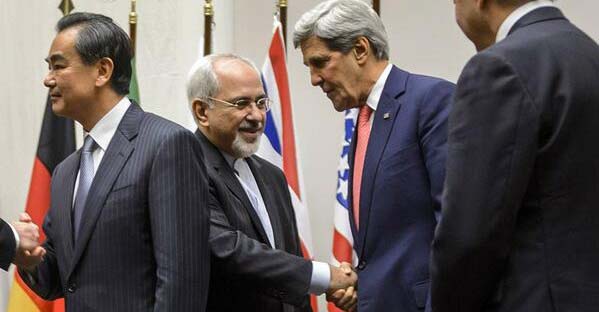GENEVA - After intensive negotiations, the P5+1 group and Iran have reached a first-step agreement on Iran's nuclear program, EU foreign policy chief Catherine Ashton announced early Sunday morning.
Ashton, who represents the P5+1 group -- the five UN Security Council permanent members Britain, China, France, Russia and the United States plus Germany -- during the talks with Iran, made the announcement at the Palace of Nations, the headquarters of United Nations Office in Geneva.
"...we reached agreement today on a joint plan of action which sets out an approach towards reaching a long-term comprehensive solution," read a joint statement, which was announced by Ashton.
"...the process leading to this comprehensive solution will include a first-step on initial reciprocal measures to be taken by both sides for a duration of six months," the statement said.
According to the White House, Iran has been committed to halting enrichment above 5 percent and neutralizing its stockpile of near-20 percent uranium by means of dilution or converting.
Furthermore, Iran has been committed not to installing more centrifuges, halting work at its plutonium reactor at Arak, and allowing inspectors from the International Atomic Energy Agency daily access to its enrichment facilities at Natanz and Fordow, the White House said.
"The work on the implementation of this first step will begin shortly," said the joint statement.
The latest round of the Iran nuclear talks, which started on Wednesday and had scheduled to conclude on Friday, entered into the unscheduled fourth day on Saturday, as U.S. Secretary of State John Kerry and foreign ministers of the five other major countries arrived here to push for a breakthrough.
This was the third round of negotiations between Iran and the six countries in more than a month.
Western countries have long been accusing Iran of developing nuclear weapons under the cover of a civilian nuclear program, but Iran insists that its nuclear program is for peaceful purposes.
In response, U.S. President Barack Obama hailed the deal as "an important first step toward a comprehensive solution" to Iran's nuclear program and "the most significant and tangible progress" ever made since he took office.
The president acknowledged Iran's right to peaceful use of nuclear energy as he said "We approach these negotiations with a basic understanding: Iran, like any nation, should be able to access peaceful nuclear energy."
In return for Iran's curbing of its nuclear program, Obama said "We will refrain from imposing new sanctions, and we will allow the Iranian government access to a portion of the revenue that they have been denied through sanctions."
The relief valued at some 7 billion U.S. dollars includes suspending certain sanctions on gold and precious metals, Iran's auto sector and petrochemical exports, licensing safety-related repairs and inspections inside Iran for certain Iranian airlines, and allowing purchase of Iranian oil at its current level, according to the White House.
Acknowledging challenges ahead in talks with Iran, Obama said after the reaching of the deal that the United States and Iran can chip away mistrust.
UN Secretary-General Ban Ki-moon has warmly welcomed the interim agreement, congratulating the negotiators "for the progress made in what could turn out to be the beginnings of a historic agreement for the peoples and nations of the Middle East region and beyond."
The UN chief called on all members of the international community to support this process which, "if allowed to succeed, is likely to be to the long-term benefit of all parties."
Iranian Foreign Ministry spokeswoman Marzieh Afkham said on Sunday "The nature of (Geneva) agreement was a success for Iran's negotiating team."
Iranian Foreign Minister Javad Zarif told reporters at an after-event press conference that now it is in a process of moving forward based on mutual respect and equal footing, and it is important that all parties see the opportunity to "end the unnecessary crisis and open new horizons".
According to Zarif, a joint commission is established to monitor the implementation of the agreement.
As for the right to enrichment, which was reportedly a major sticking point during the negotiations, Zarif said that the article 4 of Non-Proliferation Treaty (NPT) says nothing in this treaty can deprive a member state of its right to nuclear technology for peaceful purposes, including enrichment.
When asked about why the word "enrichment" is not included in the terms of NPT, Zarif said he believed it to be their right, and that they are "exercising that right and only require respect for it".
But Secretary Kerry held a different opinion on the issue.
"Let me be clear, this first step does not say Iran has a right to enrichment. No matter what interpretative comments are made, it is not in this document (NPT). There is no right to enrich within the four corners of the NPT." Kerry said.
The top U.S. diplomat said that the first step will provide the most far reaching insight in Iran's nuclear program,
He further stressed that the core architecture of sanctions remains firmly in place through the six months, including with respect to oil and financial services.
"We want to see the process put in place by which all of that is proven not through words, but with actions, and we are prepared to work in good faith, with mutual respect," Kerry said. (Xinhua)

